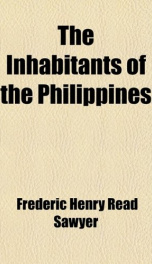the inhabitants of the philippines

Purchase of this book includes free trial access to www.million-books.com where you can read more than a million books for free. This is an OCR edition with typos. Excerpt from book: CHAPTER IV. COURTS OF JUSTICE. AlcaldesThe AudienciaThe Guard :a CivilDo not hesitate to shootTalas. The foulest blot upon the Spanish Administration in all her former colonies was undoubtedly the thorough venality of her infamous Courts of Justice. Unfortunately, amongst the heterogeneous population of the Philippines, a low standard of morality prevails and has prevailed from the earliest times. The natives at the time of the conquest were partly civilised, so far as building houses and cultivating their lands by slave labour is concerned. But notwithstanding the assertions of the Filipinos, the late Dr. Rizal and others, a study of the ancient authors demonstrates that they were sunk in ignorance and superstition, and that their customs were those of semi-savages. When they came under the rule of the Spaniards, they might have made great advances if the administration of the laws had been confided to persons of honour capable of interpreting that wise code, the " Laws of the Indies," in the noble and Christian spirit which had inspired their makers But what class of man was it that the Spaniards appointed to this office ? Thomas de Comyn, p. 134, says: "It is quite common to see a barber or footman of a governor, a sailor or a deserter, transformed into an Alcalde-Mayor, Sub-delegate, and War Captain of a populous province, without other counsel than his own rude intelligence (understanding) nor other guide than his passions." What could be expected from such men as these, living in such an atmosphere ? And if some solitary alcalde might cherish in his heart some spark of honour, some lingering love of justice, there were two elements inthe country to extinguish that spark, to smother that feeling. Woe betide the alcalde who would decide a case, whatever ...
Users who have this book
Users who want this book
What readers are saying
What do you think? Write your own comment on this book!
write a commentif you like the inhabitants of the philippines try:
Other books by this author
Do you want to exchange books? It’s EASY!
Get registered and find other users who want to give their favourite books to good hands!


